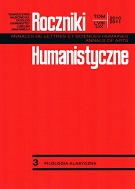Mit o Prometeuszu w Protagorasie Platona
Myth of Prometheus in the Protagoras by Plato
Author(s): Katarzyna KołakowskaSubject(s): Language and Literature Studies
Published by: Towarzystwo Naukowe KUL & Katolicki Uniwersytet Lubelski Jana Pawła II
Keywords: Plato; Protagoras; myth; Prometheus; “Great Speech”
Summary/Abstract: Protagoras is exceptional dialog of Plato because of using two modes of expression: mythos and logos. Both are used by Protagoras in Great Speech. But the fist one seems to be most important. Protagoras chose the mythical mode of expression when he described to Socrates how he make his pupils a good citizens and politicians. This famous sophist told the story about two brothers: Prometheus and Epimetheus. It’s easy to notice that Protagoras identifies with the clever Prometheus. But the attentive reader can notice that the Prometheus from the Protagoras’ myth made a decision with a fatal consequences. He entrust his brother – Epimetheus too responsible task. If the Prometheus would so clever he should predict this dramatic consequences of his decision (see the etymology of his name). It could be conscious and intentional effort of Plato who wanted to ridicule Protagoras, the main opponent of Socrates. This effect is so strong because Protagoras, who identifies with Prometheus, told the myth by himself in which Prometheus in fact is less clever one of two brothers.
Journal: Roczniki Humanistyczne
- Issue Year: 59/2011
- Issue No: 03
- Page Range: 27-37
- Page Count: 11
- Language: Polish

